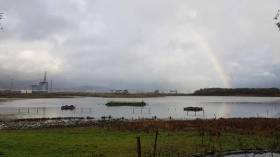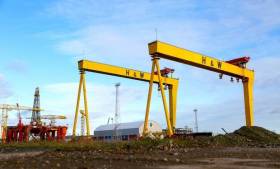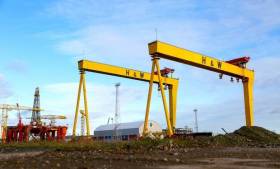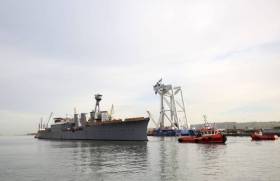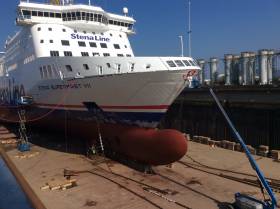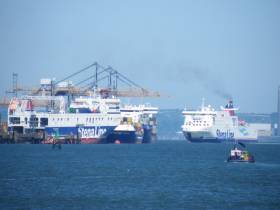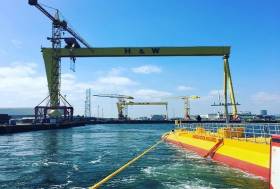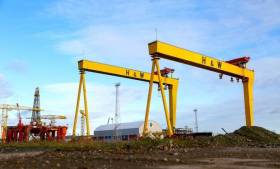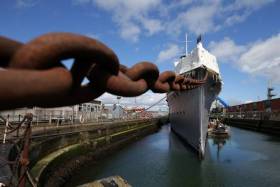Displaying items by tag: Belfast Lough News
Belfast Harbour's 'RSPB Window on Wildlife' Gives a Bird's Eye View
As you make your passage west through Belfast Harbour to the Marina you probably don’t realise that on your port side near the cruise liner terminal is gem of a wildlife sanctuary just a hundred metres away writes Betty Armstrong.
And it’s walkable from the Marina via Airport Road.
It’s called Belfast’s Window on Wildlife (Wow), run by the conservation charity RSPB (The Royal Society for the Protection of Birds), and from a huge window in the refurbished visitor centre overlooking a freshwater lagoon, you can see a huge variety of birds and ducks. There are also several Polish Konik ponies which graze the area around the lagoon, creating ideal conditions for ground-nesting birds.
"Over 200 different species have been recorded"
Over 200 different species have been recorded long with lots of butterflies, mammals, fish and plants. Binoculars are available though the birds and ducks are so close they’re hardly needed.
This time of year brings mostly ducks from the Arctic regions and Eastern Europe - wigeons, teals, shovelers and shelducks. And WOW will also sometimes even get shorebirds visiting from Siberia and North America.
From the Belfast Harbour Marina in Titanic Quarter it’s about a 45-minute walk but it’s also safe to cycle. Bikes can be hired just across the River Lagan by the footbridge.
Prospect of Naval Work at Harland & Wolff Welcomed
#NavalNewbuilds? - Proposals of future naval shipbuilding to be shared around UK yards including Harland & Wolff writes The News Letter have been warmly welcomed in Belfast.
The report prepared by Ulster-born industrialist Sir John Parker - a former chief executive at H&W - was published in London on Monday and contains many criticisms of the current status quo with Royal Naval procurement.
Although it is unlikely a brand new warship would ever be built entirely in Belfast, Sir John’s call for “sea-change” in current procurement procedures would see ships built in modular form across the UK for final assembly at a specific hub.
Current processes led to time delays in the supply of new vessels which in turn left old ships “retained in service well beyond their sell-by date with all the attendant high costs of so doing”.
Sir John said there was a “vibrant” UK shipbuilding, marine and defence supply chain sector which the Ministry of Defence (MoD) should harness.
For more on this topic click here.
200 Jobs Secured At Harland & Wolf With 'Multi-Million Pound Contract'
#H&Wcontract - A major manufacturing contract to Harland and Wolff has been secured which the company says will support 200 jobs.
The BBC News writes that the "multi-million pound contract" is with wind farm developer Scottishpower Renewables.
The engineering firm is to make 24 steel foundation jackets for wind turbines to be used in the North Sea. The work will take two years to complete.
Harland and Wolff said the new contract is "very significant for Belfast".
It added that the structures, at more than 65m tall, will almost be as "prominent in the Belfast skyline as the famous Samson and Goliath cranes".
Harland and Wolff stopped shipbuilding in 2003 and its more recent work has included refurbishing oil rigs.
In March, it announced 60 jobs were to go because of a downturn in the offshore oil and gas sector.
Accounts for last year show it had made a profit of £1m and described market conditions as difficult.
First Time in 32 Years HMS Caroline Departs Belfast Dock
#HMScaroline - For the first time in 32 years, HMS Caroline departed from its moorings in Belfast Harbour.
The Belfast Telegraph reports that the last remaining vessel from the World War One Battle of Jutland gently eased from its Alexandra Dock home yesterday (Friday) morning.
The 3,700-ton veteran light cruiser, sailed to Harland and Wolff Heavy Industries’ Belfast Dock for a scheduled hull inspection and repair.
Work is expected to last until Christmas before the ship then returns to its dock.
HMS Caroline serves as a monument to the 10,000 Irishmen who lost their lives at sea between 1914 and 1918.
Following a £15m restoration project, it opened to the public in June as a floating five-star museum and has already attracted more than 16,000 paying visitors.
For more on this rare towage operation, the newspaper features more photos click here.
Ferry Fleet to Undergo £7m Annual Refit Contract at Harland & Wolff
#AnnualRefits - The bulk of Stena Line's Irish Sea fleet are to undergo a £7m annual refit and maintenance programme contract at Harland & Wolff’s Belfast shipyard.
Each year Stena Line carries out a series of passenger facility upgrade works as well as a number of scheduled maintenance and engine works to its fleet of 11 ferries on the Irish Sea. The Harland & Wolff refit schedule for 9 of the Irish Sea fleet will start at the end of December and will run through until early May 2017 to ensure that Stena Line’s sailing schedules are not unduly impacted.
Paul Grant, Stena Line’s Route Manager (Irish Sea North) commented: “The marine refit sector is a highly competitive market and I’m delighted to confirm that Stena Line has appointed Harland & Wolff to carry out this important operational project. Stena Line is committed to supporting the local communicates in which it operates and with our expanding operations hub at Belfast Port, having a world class refit expertise close by is a real benefit. 2016 has been a record year for Stena Line across our car, passenger and freight markets on our Belfast to Cairnryan, Liverpool and Heysham routes and once completed, the refit programme will help us to maintain our market leading position into 2017.”
Stuart Wilson, General Manager of Harland & Wolff’s Ship Repair Division said: “By docking their Irish Sea fleet with us on an annual basis, Stena Line’s business has become an integral part of our ship repair activities, providing valuable support not just to our company but also to the local supply chain, who provide specialist and ancillary services as part of the vessel dockings”.
Extra Freight Capacity Added On Belfast Route Prior to Christmas
#ExtraCapacity - Additional freight capacity by Stena Line on the Belfast-Liverpool service began today, in support of the retail sector in preparation for the key pre-Christmas trading period.
Stena Line is adding an extra two sailings per week, from Friday, 21st October until 16th December. It will operate an additional Friday departure from Belfast (15.30hrs) and from Monday 24th October until 19th December it will operate an additional Monday departure (08.00hrs) from Birkenhead, Liverpool.
The extra sailings will provide increased freight capacity for up to 2 000 more freight units across the Irish Sea at a crucial time for businesses seeking to maximise their Christmas trade.
Richard Horswill, Stena Line’s Head of Freight (UK and Ireland) said: “The extra sailings we have announced today represent an additional 25% capacity on our Belfast-Liverpool freight only service with departures times designed to optimise customer delivery schedules. Since we acquired the route in 2011, this service has gone from strength to strength, especially with our freight customers, so we are confident the additional capacity will be welcome news for the freight industry at this busy time of the year.”
“Putting extra capacity on now comes at a critical time for many businesses who rely on pre-Christmas sales to make a success of their trading year. As the largest operator on the Irish Sea, we have the flexibility to respond to the needs of the market and deploy additional freight capacity where and when it’s most needed.”
#Destroyer - A UK naval destroyer was forced to cancel a visit to Belfast today, due to Russian warships understood to be bound for Syria to reinforce attacks on Aleppo, writes Jehan Ashmore.
Senior Royal Navy Officer for Northern Ireland, Commander John Gray, speaking at the 'Our Maritime Heritage' Conference held in Belfast’s Titanic Quarter yesterday, told delegates including Afloat.ie that HMS Duncan had joined a NATO flotilla in the North Sea to ‘shadow’ the Russian Navy.
HMS Duncan is the newest 'Daring' class Type 45 destroyer, which is officially affiliated with Belfast City, where Commander Gray made his comments during a talk about the restoration project of WW1 light cruiser HMS Caroline that was in the North Sea at the Battle of Jutland. The joint conference was organised by Public Record Office of Northern Ireland (PRONI).
According to the Belfast Telegraph, HMS Duncan sailed from Portsmouth on Tuesday to monitor the Kuznetsov task group in which was heading south through the North Sea and English Channel.
Theresa May has condemned Vladimir Putin's aggression in Syria as Royal Navy vessels monitored Russian warships thought to be heading to reinforce the attack on the besieged city Aleppo. The Prime Minister accused Moscow of being behind "sickening atrocities" in support of Bashar Assad's regime.
The Russian taskforce, including the aircraft carrier Admiral Kuznetsov, was being man-marked by the Royal Navy as it headed towards the eastern Mediterranean. For more the newspaper has a report here.
The fourth in a series of six Daring class destoyers built, HMS Dragon paid a visit during Cork Volvo Week in July.
Floating Turbine Departs Belfast Lough
#FloatingTurbine- Scotrenewables an Orkney based developer whose 2MW floating tidal turbine as previously reported on Afloat has departed Belfast Harbour for its Kirkwall headquarters.
ReNews reports that the SR2000 will undergo final checks at Kirkwall before installation at the European Marine Energy Centre’s Fall of Warness grid-connected site.
The 64-metre long device is being towed by Scotmarine’s Orcadia II vessel.
The 550-tonne device has been undergoing trials at Belfast Lough to test its leg actuation system. The trials also replicated tidal flow and tested power take-off functionality.
#H&W - Harland and Wolff, Belfast faces a tough year ahead having failed to secure a "sufficient workload" as the latest accounts shows a big drop in profits for 2015.
The Belfast Telegraph writes that the firm generated operating profit of £1m for the year ending December 2015, according to the latest accounts for Harland & Wolff Heavy Industries Ltd.
That was down from £8.6m a year earlier, however, turnover rose to £66.7m from £55.2m.
It says the directors consider the "results for the year are reflective of the difficult market conditions".
For more click here
Families of WWI Irish Sailors to Pay Tribute at Jutland Warship
#HMScaroline - Descendants of First World War Irish sailors reports the Belfast Telegraph are to take part in commemoration ceremonies in the city where the only surviving vessel of the Battle of Jutland remains.
HMS Caroline has undergone a multimillion-pound overhaul and will be transformed into a floating interpretive centre of the landmark conflict.
The light cruiser saw action during exchanges off the Danish coastline on May 31 1916. It is moored in Belfast's Titanic Quarter and will be a focus of international remembrance next month.
The following day it will open its doors to the public, with tickets costing £12 per adult and £5 for a child.
Much of the ship's superstructure is still covered up as work continues.
The drill hall will be turned into an interpretive centre while visitors will be able to view the oil-powered engines, the areas in which the ordinary sailors slept in hammocks and the place below deck where seamen could control the vessel while coming under attack.
For much more on the story, click here.



























